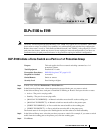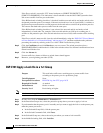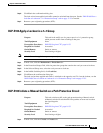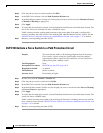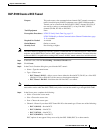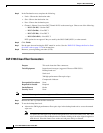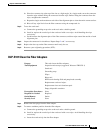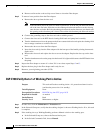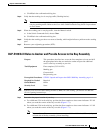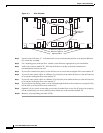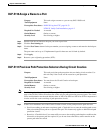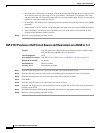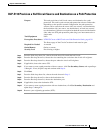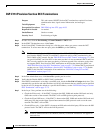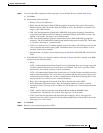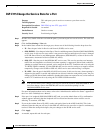
17-5
Cisco ONS 15600 Procedure Guide, R8.0
Chapter 17 DLPs E100 to E199
DLP- E105 Create a DCC Tunnel
DLP-E105 Create a DCC Tunnel
Note The ONS 15600 can support up to 64 DCC tunnels. Terminated SDCCs cannot be used as a DCC tunnel
endpoint, and an SDCC that is used as a DCC tunnel endpoint cannot be terminated. You must delete the
terminated SDCCs in a path before creating a DCC tunnel. All DCC tunnel connections are bidirectional.
Step 1 In network view, click the Provisioning > Overhead Circuits tabs.
Step 2 Click Create.
Step 3 In the Circuit Creation dialog box, provision the DCC tunnel:
• Name—Type the tunnel name.
• Type—Choose one:
–
DCC Tunnel - D1-D3—Allows you to choose either the Section DCC (D1-D3) or a Line DCC
(D4-D6, D7-D9, or D10-D12) as the source or destination endpoints.
–
DCC Tunnel - D4-D12—Provisions the full Line DCC as a tunnel.
Note DCC Tunnel - D4-D12 type is not supported on ONS 15600. Use the DCC tunneling functionality if the
network has nodes other than ONS 15600, and you do not want the tunnel to go through ONS 15600.
Step 4 In the Source area, complete the following:
• Node—Choose the source node.
• Slot—Choose the source slot.
• Port—Choose the source port.
• Channel—Shown if you chose DCC Tunnel-D1-D3 as the tunnel type. Choose one of the following:
–
DCC1 (D1-D3)—Section DCC
–
DCC2 (D4-D6)—Line DCC 1
–
DCC3 (D7-D9)—Line DCC 2
–
DCC4 (D10-D12)—Line DCC 3
DCC options do not appear if they are used by the ONS 15600 (DCC1) or other tunnels.
Purpose This task creates a data communications channel (DCC) tunnel to transport
traffic from third-party SONET equipment across ONS 15600 networks.
Tunnels can be created on the Section DCC (SDCC) channel (D1-D3) (if
not used by a node as a terminated DCC), or any Line DCC (LDCC)
channel (D4-D6, D7-D9, or D10-D12).
Tools/Equipment None
Prerequisite Procedures NTP-E32 Verify Node Turn-Up, page 5-2
NTP-E128 Modify or Delete Communications Channel Terminations, page
11-8, as needed
Required/As Needed As needed
Onsite/Remote Onsite or remote
Security Level Provisioning or higher



